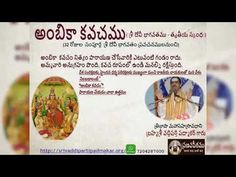
Lines 176-177 Worshiping Goddess Saraswathi, the goddess of knowledge.Lines 160-175 Praises the Lord by His various names and His divine deeds.Lines 158-159 Prayer to maintain a cordial relationship with others.


Lines 149-157 Concerns with freedom from diseases.Lines 141-148 Concerns with the protection from wild and venomous animals.Lines 130-140 Concerns with prayer to the God's Messenger to release the devotee from the vicious cycle of birth and death.Lines 103-129 Concerns with eradication of vicious effects of demons and devils.Lines 96-102 Concerns with the Lord's saving of His devotee in all times of the day.Lines 59-95 Praising the Lord, these lines concern with the protection of individual parts of the body.Lines 57-58 Surrendering of the devotee to the Lord and the devotee's prayers unto Him.Lines 55-56 Depicts the swiftness of the Lord in coming to the rescue of His devotee.Lines 46-54 Author strings the sounds of the Lord's footsteps and anklets into mantras.Lines 33-45 Author describes the way the Lord looks at the devotee.Lines 28-32 Upon using mantras, the divine light and the presence of the Lord is felt.


The lines 'Chiragiri Velavan' in the hymn refers to the Lord of Chennimalai. The place where Balan Dhevaraya Swami staged the hymn is the Chennimalai Subramania Swamy Temple near Erode in Tamil Nadu. The hymn was composed in the 19th century by Balan Dhevaraya Swami. Kanda Sashti Kavasam was composed in the 19th century. Tamil contains many ancient hymns in praise of deities. 1820), a student of Meenakshi Sundaram Pillai, on Lord Muruga, the son of Lord Shiva, in Chennimalai near Erode. Kanda Shashti Kavacham or Skanda Sashti Kavasam ( Tamil: கந்த சஷ்டி கவசம்) is a Hindu devotional song composed in Tamil by Devaraya Swamigal (born c.


 0 kommentar(er)
0 kommentar(er)
